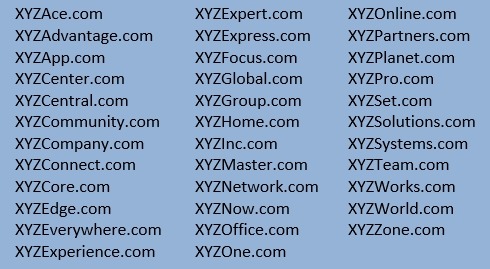One of the hardest financial decisions you'll face when naming or renaming a company or product is whether you should splurge for the exact .com domain name—and, if not, how you should adapt the URL so that it fits with your brand and allows consumers to easily find your site.
On the one hand, buying an exact .com domain makes finding your website much easier for customers and lends invaluable prestige to your company. On the other hand, purchasing an exact .com domain can be very expensive, especially if you are looking for a real English word.
Furthermore, limiting yourself to just exact .com domains will likely exclude names that otherwise would work well for your brand but are simply unavailable for purchase as a domain.
Here is my advice for anyone struggling with such a decision.
Buying the Exact .com Domain
You should probably pursue the exact .com domain in the following three situations:
- If your company is involved in online commerce, or consumers make transactions through your website, then invest in the exact URL. Retailers benefit from the cachet of an exact domain. Also, you don't want customers to have difficulty finding you; if they have to google you, they can be potentially siphoned away by ads or other search results.
- If you are renaming an established company that previously had an exact .com, you should procure the exact .com for your new name as well. Opting for a modified URL in that situation would be a step toward lower prestige and could exacerbate a (fairly unavoidable) period of confusion after the renaming.
- If you are the sole heir to the fortune of Mrs. Moneybags—or you're VC-backed—and you have ample funds at the ready, then go for it! You might as well give your company as much of an advantage as possible.
The reality is, however, that most startups or SMBs don't have the money to pay for a premium domain—and that's OK. They still have some common options for finding an available, affordable Web address:
- Modifying a .com domain
- Using a country code top-level domain (ccTLD)
- Using a global top-level domain (gTLD)
Modifying a .com Domain
If done right, modifying a .com domain won't inhibit a good company from growing and succeeding. Famously, Dropbox started at www.getdropbox.com, Square started at www.squareup.com, and plenty of companies that never even dropped the modifier—such as Method at Methodhome.com, or us here at CatchwordBranding.com.
If this is going to be your approach, first identify modifiers common to your industry, such as "health" or "medical" for healthcare services; using such modifiers will make your website address easier to remember for consumers.
Alternately, there are plenty of common and accepted modifiers that are almost universally applicable, such as inc, systems, solutions, company, network, or team. If you want a particularly active- and often imperative-sounding address, try a modifier before your name, like one of these:

More common is using a modifier after the name. Here's a long but not exhaustive list of the ones we regularly recommend to clients:

Of course, there are plenty of other options; you just need to find the one that fits best with your name in tonality (Inc sounds more corporate, Go is active, Planet is friendly), sound (maybe one is alliterative, or simply more euphonic), and of course, budget and availability.
It's likely you'll find some options that are unregistered, and some that you would have to buy.
Using an Alternate ccTLD
Another route you can take for a more reasonably priced domain name is to use a non-.com TLD. Country-code TLD extension, such as .ly (Libya), .co (Colombia), and .me (Montenegro) have become prolific and accepted by consumers in recent years.
Some of those extensions will need to be incorporated into your name (Instagram started out as Instagr.am (Armenia), for example), and you probably shouldn't use a domain with .ly if you don't want it to be part of your name when spoken aloud. Other extensions, such as .co, can simply replace the .com.
As with the modifiers, certain extensions are linked with certain industries; for example, .io (British Indian Ocean Territory) extensions are being used by technology companies, because "io" is shorthand for input/output, and .tv (Tuvalu) is associated with—you guessed it—television or video streaming sites.
The danger with using alternate TLDs is that they are trendy, and trends go in and out of style. The .ly extension is already beginning to feel shopworn (Bit.ly is now Bitly.com), and new companies with -ly names can seem uncreative. In the future, .ly domains may feel as passé as .net and .biz.
Using a New gTLD
Finally, consider finding an available domain among the hundreds of new global top-level extensions becoming available:
- Keyword extensions such as .law, .health, and .food
- Location-specific extensions such as .NYC and .Vegas
- Branded extensions such as .IBM and .YouTube
Though consumer acceptance of these nascent domains has yet to be established, the recent enthusiastic embrace of select ccTLDs is an indication that the more intuitive and practical gTLDs will be accepted as well.
So, especially for individuals and small businesses, consider choosing a descriptive extension like .pizza or .photo. Or, if your business is located in New York City and you don't plan to expand beyond that region, consider a .nyc domain. (In fact, that extension has grown the fastest so far.)
Alternately, many of the modifiers I mentioned in the previous section exist or will launch soon as gTLDs, so you could register your domain at, for example, a .company, .app, .world, or .zone URL. (See this comprehensive list of available gTLDs.)
* * *
Finding the right URL can be daunting, but with a little time and effort you can absolutely find a domain that works for your brand—and your wallet!




